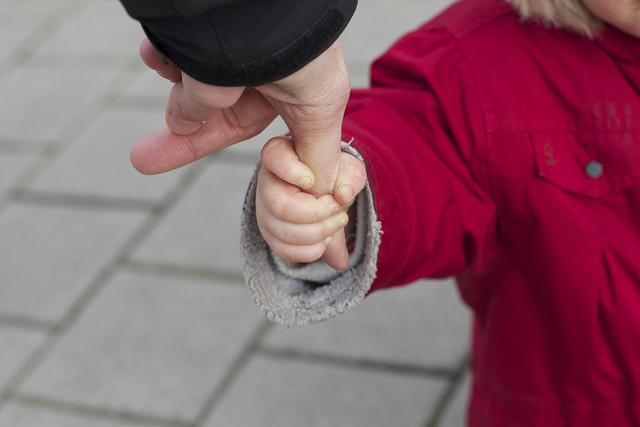I “attachment parented” without reading anything about it.
I attachment parented without knowing anything about my own attachment history or strategies.
I am in many ways the women I am writing about. I attachment parented my way into a form of indentured servitude.
I work with women who have experienced birth injuries and birth trauma. I am writing a book for Shambhala Publications on the post-partum period. I spend a lot of time talking to new mothers. The universal is that mothers are trying to do it all. And doing it all is taking on a lot of forms.
We are all familiar with the image of the working mother who is leaving her two month old at day care to get back to her office, clinic, company, Wall Street—pumping at work, and beyond exhausted at night. This mother is literally trying to do it all. She works a full-time job; she sustains her child through her own body. She didn’t get much time off. If she was offered it, she may have gone back to work early, eager not to lose her place or her rhythm at work. When she was pregnant, two months seemed like a lot. Now two months seems like nothing—it passed by in a total blur. She doesn’t feel like herself, but is performing like herself. She has to! She has to sacrifice herself so that her family can pay their bills, and so that she continue on the path that she has chosen.
The mother I most frequently see in my practice is indentured to attachment parenting. It’s the new version of the 1950s housewife who had three meals on the table and a clean house, always ready to host. The look has changed. Now she has an Ergo and herb-infused water bottle wherever she goes. This woman is a yogini or a Buddhist. She has mala beads she made, probably at her Mother Blessing. She carries her baby everywhere -why wouldn’t she—natives all over the world do it! Her back and sacroiliac joints are killing her or she has a diastasis that won’t heal. Nothing will get in the way of her carrying her baby everywhere. If her back has to hurt, well then so be it. She’ll fix that later. Her baby needs her.
She brings organic salads from her garden to potlucks. Her skin is glowing because of the organic meals that she is eating. She sneaks raw cacao balls- the only sugar and caffeine she’ll allow herself. Of course she is nursing throughout her next pregnancy.
Oh the pressure for perfection and all the forms it takes!
There is such a huge paradox in parenting. On the one hand it is an ego destroyer of the highest degree. Mothering requires us to let go of our preciousness and to put the needs of another first. Things don’t always go my way, on my time, how I want it. The problem is that some of us don’t have a strong ego to begin with and it is all too easy to put another’s needs first.
In fact, it is hard for us to ferret out our needs. If we are used to setting our needs aside, it is easy to keep doing that, and attachment parenting can become an extension of that. Mothering is a giant multi-tiered balancing act, where we are constantly measuring just how much we need something. A deeper level of inner organization is required so that, even as our ego is crumbling, we can tend to our own needs in order that we can tend to the babies’ needs. It’s a cycle of letting go of our agenda, and at the same time holding on to some of it!
I carried my daughter around Rio de Janeiro until she was three years old in an Ergo. I had experienced a stage four tear during birth, and had pretty severe lower back and sacroiliac pain from the birth injury. I had reasons for babywearing—like my neighborhood sidewalks were made of cobblestones and impossible for strollers, unless I wanted to give my daughter some crazy whiplash.
It’s also hard to carry a stroller down subway stairs.
But what was operating on a deeper level was an ideal of what it was to be a good mother. To me, a good mother meant that I was present and deeply attuned to my daughter’s needs. It meant sacrificing my own needs and always giving to her first. (Of course I had heard the “put on your oxygen mask first” theory) I was so consumed by this total attentiveness and involvement that I was totally blind to my own needs. I thought that I was choosing this way of parenting. Actually it was more of a reaction to how I attached to my own mom in early childhood, than it was an adult choice about how to raise a child. I am not calling attachment parenting an unconscious or infantile decision. In fact, I think there is a lot of beauty in it. But I want women to have permission to remember who they are as they become mothers, and to do so consciously.
Becoming a mother is a complete identity overhaul. There are moments when we simply cannot see ourselves. We are not sure who we are. This is a genuine rite of passage. If this was a recognized rite of passage, the path would be lit by elders and there would be other women around who had also been through this passage. Those women would help divide the attachment. The baby or child would be attached to aunties and grandmothers not just one primary caregiver.
The nuclear family gives us a false idea that we are solely responsible for our children. It can be a narrow connection, with a lot of responsibility and weight.
The concept of attachment parenting was borrowed from a tribal model. The idea of the “Fourth Trimester” came from a tribe in South Africa that an American doctor observed, where the infants had no colic. He saw that these babies were carried all day long and breastfed on demand, and recommended these practices along with several others. When a tribe is raising a child, it is not just the mother who carries the baby. A little brother or sister carries the baby. A grandmother carries the baby. In most of these tribes, women are also protected and nurtured for the first 30 to 40 days after having a baby.
There are ceremonies to seal a woman’s energy body and physical body. She doesn’t give birth and then start carrying the baby right away. We cannot underestimate the power of these 30 days to help a woman regain her energy and strengthen her whole system.
Every mother I work with is deeply invested in this question of how to best care for herself and her baby’s needs. Sometimes needs are competing. Sometimes what we need as a mom—space, food, movement—is literally impossible for us to get. (I call this the “Burn”) And sometimes no amount of what we give meets our babies’ needs. It is easy to get in a rut of resignation to not getting our needs met.
Don’t give up! We all are finding our way to a workable give-and-take.
The archetype of the mother who is a martyr runs deep in this Protestant Puritanical culture that values productivity above all. I like to think that becoming a mother—being awake, alive and present with the rhythms of new motherhood- is medicine for our forward moving, ambitious lives. May you give yourself permission to be bigger than your parenting style, to be less than perfect. The last thing most women need is more input on how to parent, but I feel like we benefit a lot from choosing wise counsel of other parents whose styles we admire.
There is no glory in suffering, no prize for how much we sacrifice.
May we all find a deeper path towards love—for ourselves, our children, and our planet.
Author: Kimberly Johnson
Editor: Renée Picard
Image: Stephan Hochhaus at Flickr
 Share on bsky
Share on bsky






Read 4 comments and reply